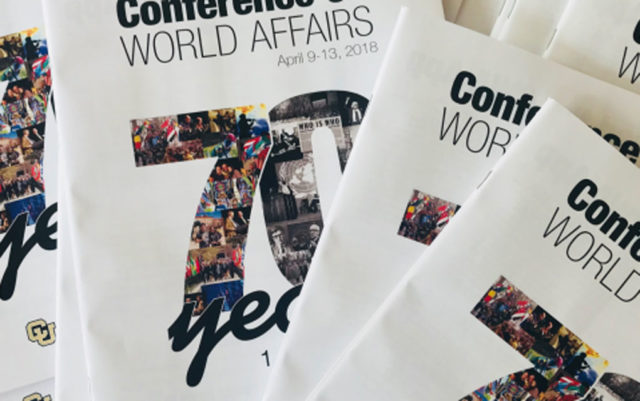
We don’t think it’s a stretch to say that the Conference on World Affairs is much more than a conference. Over the course of 70 years CWA has become an integral part of Boulder’s identity, a nucleotide in the city’s DNA. This meeting of the minds helped shift CU Boulder’s reputation as a “ski” school to that of an intellectual’s paradise. It brings great thinkers together to tackle issues both profound and profoundly entertaining and, most importantly, draws a community closer together in the name of hosting an eclectic weeklong event now featuring 200 panels and 100 speakers. The payoff? The satisfaction of watching 70,000 people show up each year.
At its core, CWA is an altruistic endeavor, organized and driven by volunteers who receive no special treatment for their service, and made famous by the scores of academics, thought leaders, circus performers, journalists, poets, artists, CEOs, musicians, politicians, social justice advocates, playwrights, environmentalists and others who come to speak and perform for no compensation — and travel at their own expense, to boot.
To think, it started off with a single speaker back in 1948. Its founder, sociology professor Howard Higman, only intended it to be a one-off tribute to the United Nations, but it was so popular the university asked — some reports say ordered — Higman to make it an annual event.
CWA has always been a reflection of Higman’s deep belief in the power of knowledge. He studied art as an undergrad, sociology as a graduate student, taught himself gardening and architecture, and became an accomplished French chef. But the conference was his greatest passion, and through his devotion he brought in diverse personalities such as Eleanor Roosevelt, Henry Kissinger, Buckminster Fuller, Studs Terkel, Arthur Miller, Harry Belafonte, Ralph Nader and, the conference darling for 40 years, Roger Ebert (whose Cinema Interruptus is a highlight to this day). The conference quickly morphed from a forum on international affairs to a smorgasbord of diversified topics.
This year’s conference will be no different.
Tony Seba is one of the keynote speakers. The co-founder of think tank RethinkX has championed disruptive technology that will drive society away from individual car transportation and toward 100 percent renewable energy sources. Seba predicts that by 2030 all new energy will be provided by solar or wind power, all new mass-market vehicles will be electric (and all will be autonomous or semi-autonomous), gasoline will be obsolete as will 80 percent of both highways and parking spaces. His talk will address the disruptive technologies that will lead us to a new era of renewable energy and efficient transportation.
U.S. Olympian and author Aly Raisman will present the student keynote address this year. Raisman recently took the lead in uncovering decades of sexual abuse against hundreds of female gymnasts at the hands of Dr. Larry Nassar.
Joe Cirincione, nuclear security analyst for MSNBC, and Susi Snyder, nuclear disarmament program manager for PAX in the Netherlands, will speak about international nuclear disarmament. The inaugural youth poet laureate of the United States, Amanda Gorman, will perform on the closing day.
And then there are the panels — 200 of them.
The event kicks off with panels on the impact of fake news, perspectives on Islam, life after incarceration, water policy and healthcare. And that’s all before lunch.
Roger Ebert’s Cinema Interruptus, now lovingly called Ebert Interruptus in memoriam, is a perennial favorite. The famed film critic took time over days to sit and talk with audiences about a single film, stopping scene by scene and providing running commentary. This tradition has continued since Ebert’s passing in 2013. This year film critic Josh Larsen returns as the host of Ebert Interruptus — with Boulder Weekly’s own Michael J. Casey moderating — to dissect Mad Max III: Fury Road, a film that imagines a world where men are mere pawns of maniacal leaders and women cling to hope. As always, CWA effortlessly demonstrates how pop culture mimics reality.
It’s impossible — and foolish — to try to tell you what not to miss at CWA. If we all had our druthers we’d be able to travel to and froe in time and catch every panel, but alas…
That being said, keep an eye out for panels on women in politics, the refugee crisis, corruption in sports, art as an agent for change, understanding transgender identity, the alt-right, food security, net neutrality, Trump foreign policy and jazz.
What we’re trying to say is there’s no stone unturned. Everything is interesting and any panel you choose to attend is the right choice.
So, let us be the first to say thanks to all the people who have made the Conference on World Affairs possible over the last seven decades. You’ve helped enrich the lives of hundreds of thousands of people.
Here’s to 70 more years.














